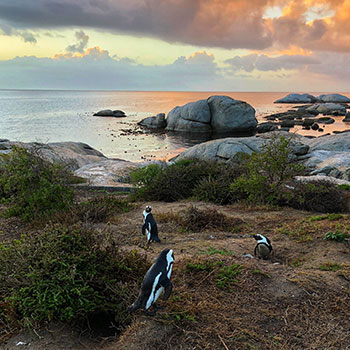Introduction to Biotechnology
Sciences & the Environment Program
Cape Town, South Africa
Dates: 7/8/22 - 11/16/22

Introduction to Biotechnology
OVERVIEW
CEA CAPA Partner Institution: University of Cape Town
Location: Cape Town, South Africa
Primary Subject Area: Engineering
Instruction in: English
Course Code: CHE2006S
Transcript Source: Partner Institution
Course Details: Level 200
Recommended Semester Credits: 5
Prerequisites: BIO1000F, CHE1005W
DESCRIPTION
The course aims to introduce engineers to the fundamentals of biotechnology, pertinent to bioprocess engineering. This is achieved by building an understanding of the key concepts and elements of biotechnology, including molecular components, information transfer and metabolism; the basic concepts of applied microbiology, including microbial cell structure, microbial classification, cell division and nutritional requirements; and the basic concepts of molecular biology and genetic engineering, especially recombinant DNA technology. Using these, a working knowledge of microbial growth kinetics, enzymology and bioenergetics is built. Further, a working knowledge of mixed microbial culture dynamics is established. Skills are developed to enable quantitative descriptions of microbial transformations. Further a practical working knowledge of enzymology, microbial growth, kinetic studies and aseptic transfer are developed.
DP requirements: Attendance at all practical, project and tutorial sessions. Submission of all assignments, tutorials and practicals. A weighted average of 40% for the class mark (includes class tests, assignments, tutorials and practicals).
Assessment: Class test, assignment portfolio including practical assignments and written exam.
The University of Cape Town awards credits based on the National Qualifications Framework (NQF) to determine course and contact hour recommendations per course. 1 NQF credit represents roughly 10 notional hours of work which includes study time, assignments and examinations. Notional hours may very per courses depending on the course level and modality therefore, CEA recommends using NQF credits as a basis to determine U.S. equivalencies (1 NQF=.222 semester credits)
DP requirements: Attendance at all practical, project and tutorial sessions. Submission of all assignments, tutorials and practicals. A weighted average of 40% for the class mark (includes class tests, assignments, tutorials and practicals).
Assessment: Class test, assignment portfolio including practical assignments and written exam.
The University of Cape Town awards credits based on the National Qualifications Framework (NQF) to determine course and contact hour recommendations per course. 1 NQF credit represents roughly 10 notional hours of work which includes study time, assignments and examinations. Notional hours may very per courses depending on the course level and modality therefore, CEA recommends using NQF credits as a basis to determine U.S. equivalencies (1 NQF=.222 semester credits)







